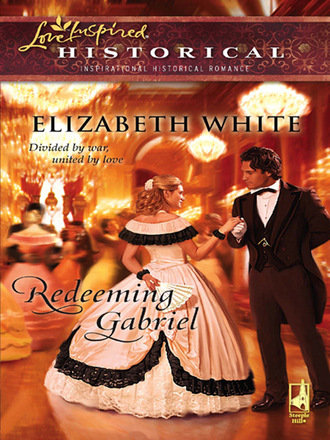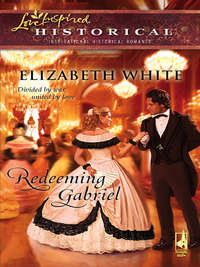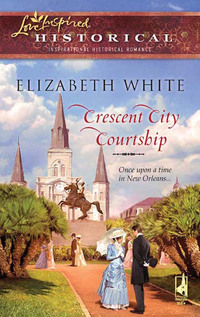
Полная версия
Redeeming Gabriel
“I suppose it could be done.” The other man paused. “Laniere thinks he can correct the problem with the propeller. If nothing else goes wrong, we could break the blockade.”
Papa chuckled. “Excellent. I intend to be situated in a place of influence when we send the Yankees back north where they belong.” There was a scrape of chairs, a mutter of goodbyes, and the light was extinguished.
Camilla leaned against the house. Her father was setting himself up to make pots of money off a vessel so secret that it had to be scuttled before the Yanks could get their hands on it. It was one thing for her father to comply with the Confederate army’s demands that he provide transportation for the troops—strictly a defensive service. But to invest family money in a deadly weapon…
Maybe she’d misunderstood.
On shaky legs she crept around the side of the house and climbed the wisteria. She pulled herself through the open window and collapsed onto the floor. Sitting against the window seat, she removed her filthy clothes and tossed them under the bed. The room reeked of turpentine.
She hoped Lady wouldn’t take a notion to visit. Her grandmother never let a thing go by, which was how she kept the household under control, but so far she didn’t know about the underground railroad. And she didn’t know about Camilla’s communication with Harry.
Camilla rose to light the lamp, then unbuttoned her shirt and yanked it off. With a little grunt of frustration, she picked the knots free and unwound the linen strips that bound her bosom. Gradually she could breathe more freely. She heaved a sigh of relief as the last strip fell into her lap. Then she remembered the folded paper in her pocket. Rummaging under the bed, she found it and eagerly unfolded it.
She frowned. This wasn’t a letter. It was a sermon. She skimmed to the bottom. Harry always signed his name, but there was no signature here.
She read the sermon again. It was taken from the biblical account of the Israelite spies Moses sent to infiltrate the land of Canaan.
Mystified, she slipped on her nightgown and tucked the paper into the lacy ruffle of her sleeve. The stranger on the boat had said her name. And she’d never forget that voice. Smooth and deep, like the cough syrup Portia poured down her throat when she had the croup.
The familiar way he had touched her mouth and her hair had been abominable, but he’d kept her from being discovered by the deckhand. His arms had held her gently.
Cross-legged on the cushion at the open window, she touched her lips. She could still taste a faint saltiness from his hand. He’d said she had a pretty mouth. How would he know that? It had been pitch-dark almost the whole time. Maybe Harry had described her.
What did he mean by asking her to deliver the sermon to the “Man Upstairs”? The whole scene had been so bizarre and confusing. She’d forgotten all about looking for Virgil’s bag. Maybe she could make him a new one. Sighing, she rose to blow out the lamp.
The doorknob rattled.
She nearly dropped the candle snuffer. She’d nearly forgotten Portia, who always brought her bathwater and something to eat after a running. She hurried to unlock the door.
Portia stomped in with a brass can of steaming water under one arm and a stack of clean linen under the other. “If ever I saw such a mess of idiots in all my born days!” She thunked the can down on the washstand and faced Camilla with a righteous glare.
Camilla shut the door, a finger to her lips. “You’ll wake up Lady—you know what a light sleeper she is!”
“You two hours late, missy.” Portia tossed the linen on the bed, reached for Camilla and yanked the nightgown off over her head. “Horace says you all nearly get caught by the graycoats, then by the grace of God you get the delivery to the station—then Miss Camilla ups and takes off again without a word of explanation!” Portia’s nostrils flared. “Bathe quick, before that smell sticks to you permanent. Then you can eat while you tell me where you been.”
“I’m sorry, Portia.” Camilla meekly began to wash.
“Hmph.” Portia dug under the bed and came up with Camilla’s stinking clothes. “You fall in a pigpen on the way home?”
“It’s the pitch from the boat.” Camilla completed her bath, hung her towel on a brass rack beside the washstand and picked up her hairbrush. It was going to take hours to get the tangles out of her hair.
Having already bundled the offending clothes into a canvas bag and tossed the whole thing down a laundry chute, Portia snatched the brush. “Lucky you didn’t get the stuff in your hair—we’d be cuttin’ it off right about now.”
A haircut would be less painful than Portia’s brisk strokes with the brush, but Camilla closed her eyes and endured. She deserved a certain amount of pain for her stupidity.
“You gonna tell Portia where you been for the past two hours?” The brushstrokes slowed and gentled. “I been just about out of my mind, worrying.”
Camilla rested her head back against the cushion of Portia’s bosom. “I had to go back to fetch something I left on the boat.”
“It better been something almighty important.”
“It was Virgil’s news bag.” Camilla waited for the explosion that didn’t come. Feeling a tremor under the back of her head, she opened her eyes.
Portia’s dark face was perfectly bland, though there was an amused spark in the back of her eyes. “Girl-child, you’re gonna put yourself out one too many times for that cockeyed old man. I sure hope the Lord makes good on that promise about ‘doing it unto the least of these.’” She snorted and began to brush again. “Virgil Byrd’s about the least of anything I ever seen!”
Chapter Two
Gabriel woke to the sound of a timid scratching at his door. Having long ago trained himself to sleep with one foot on the floor, he moved in one fluid step to the door, his derringer cocked and ready to fire. “Who is it?”
“Reverend Leland, it’s S-Sally. Sir.”
Reminded of his ministerial alter ego, he relaxed and lowered the gun. Opening the door, he found the young maid who had escorted him to his room yesterday twisting her apron into a white corkscrew. “A bit early in the day for spiritual counseling, my dear,” he said dryly.
Sally’s blood climbed to the ruffle of her mobcap. “Sir, I got an urgent message.”
Gabriel pulled his galluses up over his shoulders. “What is it?”
“They’s a lieutenant downstairs, told me to come get you on the double. Said tell you there’s a lady been took by Colonel Abernathy, and she needs you right away.”
Gabriel’s blood froze. The only lady he knew here was Delia Matthews. “Tell the lieutenant I’m on my way, and ask him to make my—ah, cousin as comfortable as possible.”
The mobcap bobbed and disappeared.
Gabriel dressed and shaved, managing to nick his chin with the razor in his haste. Irritated, he examined the cut in the mirror. Beards and mustaches were in fashion these days, but yesterday’s trip to the barber was essential to his disguise. He hadn’t been clean shaven since his sixteenth birthday; he hardly recognized himself. In fact, he’d forgotten about that arrow-shaped scar his brother, Johnny, had put on his upper lip when they were kids. He touched the scar. Johnny was probably dead by now. Ma always said the good died young.
Gabriel had every intention of living to be an old man.
Escorted by the young lieutenant, he fumed all the way downtown to Confederate headquarters. Delia should have been headed upriver with her troupe by now. If they’d left without her, he had no way to get the cipher into Union hands with any expediency. And what if she’d been searched?
His wait in the luxurious parlor of the Rice mansion, which housed Colonel Abernathy’s staff, did nothing to cool his temper. His only consolation was the proximity of his understuffed horsehair chair to the two yawning sentries lounging on either side of the front hall. He couldn’t help wondering why this war was taking so long. Grant or Sherman ought to stroll down here tomorrow and round this bunch up like so many hound dogs snoozing in the shade.
He was beginning to lose interest when the secretive note in the voice of one of the sentries brought him fully awake.
“You hear about the delivery coming in tonight?”
“Yeah. About time, too. If I’d known there wasn’t gonna be no whiskey allowed, I’d thought twice before joining up. Where’s it coming from?”
“Somebody caught a couple darkies with the Birdman last night. First time anybody’s actually seen ’em. Promised if they’d let ’em go they’d pass the next shipment our way.”
The first sentry chortled. “The Birdman may be crackers, but he knows his blackstrap.”
Hat over his face, Gabriel settled his head on the carved rosewood frame of the chair. So the Rebel army wasn’t above dealing in contraband whiskey. Idly he wondered about the identity of the Birdman, but a sudden series of piercing shrieks from the upper floor of the house brought his head off the back of the chair. The sentries jumped.
The shrieks escalated in volume as a door opened and a harried-looking junior officer appeared at the bend of the stairs. He mopped at some beige-colored liquid dripping from his eyebrows and mustache. “Is there a Reverend Leland down here somewhere?”
The shrieks ceased as Gabriel stood. He had his story planned out. “I’m Reverend Leland. I see you’ve made my cousin’s acquaintance.”
The young man glanced over his shoulder. “That woman don’t act like nobody’s cousin—except maybe Old Nick’s. I’m pretty sure she sprung straight from the gates of Hades. Colonel Abernathy wants to see you. Right this way, sir.”
They found the colonel in an upstairs bedroom, which had been converted into an office with the addition of a desk and a couple of bookcases. The colonel’s lank brown hair stood on end, a bit of egg yolk adorned his left sideburn, and grease stains marred the military perfection of his gray coat. He rose with an agitated scrape of his chair. “Reverend! Last night my men apprehended a young woman, and she—well, she’s what you might call a bit of a handful.” The colonel blushed. “She claims to be a gentlewoman, but we know she’s been traveling up and down the river as an actress.”
Raising a sardonic eyebrow, Gabriel took the proffered chair. “Working as an actress might not be the most respectable occupation for a woman, but it isn’t illegal.”
“Of course it isn’t, but one of my men claims Miss Matthews was pumping him for information.”
“And your man was completely sober?”
The colonel picked up a perfectly pointed quill in his inkstand and began to sharpen it. “You know as well as I do it’s against army regulations to sell whiskey to military personnel.”
“Of course.” Gabriel sat back. “Would you mind filling me in on the circumstances of my cousin’s arrest?”
The colonel huffed. “It seems Private Hubbard was enjoying a bit of leave aboard the Magnolia Princess last evening, and—well, Hubbard, being a strapping young man—caught Miss Matthews’s attention. She invited him to her room after her performance.”
Gabriel kept his tone cold and incredulous. “I think I have the picture, Colonel. The scarlet woman seduced your innocent young enlisted man, plied him with liquor to loosen his tongue and proceeded to pull information out of him in order to sell it to the enemy.” The accusation sounded melodramatic and silly—the plot of a riverboat play.
“That’s about it.” Abernathy ran a finger around his collar. “Unless you have some other explanation.”
Gabriel straightened. “I don’t have to explain anything to you. The word of my clerical office should be enough to proclaim my misguided young relative’s innocence.” The colonel took a breath, but Gabriel forestalled him with a raised palm. “My family history may shed some light on our current dilemma.”
Abernathy nodded stiffly.
“Miss Matthews—Delia—is the daughter of my father’s brother, the product of his marriage late in life to a serving woman with designs on his pocketbook. When the little girl was barely walking her mother took off with a man of heftier income.” Gabriel paused to let this pathetic picture settle in his companion’s mind.
Since the colonel seemed to have forgotten the breakfast tray heaved at his chest, Gabriel embroidered the story. Delia became a misunderstood soul looking for love in a callous world. She had run away to join a traveling theater troupe, and Gabriel, as her closest male relative—her father having long since expired of a broken heart—had been searching for her ever since.
“I’d only last week received a hint of her whereabouts,” he concluded. “My mission is to see her restored to the bosom of her family.”
The colonel looked impressed. “I declare.”
Gabriel coughed delicately. “As I said, I’d nearly caught up with my cousin, and it was a simple matter to follow the trail of…shall we say, smitten officers and gentlemen.”
Abernathy smiled sourly. “The lady has a way of choosing her targets.”
“All the more reason to get her out of your hair, so to speak—” Gabriel eyed the egg yolk “—and return her to her home.”
“I must admit I don’t know quite what to do with her.” The colonel rose and went to the window. “I cannot allow my men to go unpunished when they compromise military information, and yet the lady hardly seems to have the mental discipline to remember what she heard, much less pass it into enemy hands.”
“Have you questioned her?”
“I tried, but with very little intelligible response.”
Gabriel grinned at the colonel’s back. “Perhaps if I spoke to her in your presence I might assuage your fears.”
“Yes, that’s the ticket.” The colonel turned. “Bowden!”
The young officer stuck his damp, sticky head around the door. “Sir?”
“Tell Miss Matthews we require her presence.”
Lieutenant Bowden looked as if he’d just been requested to shave a barracuda. He shifted from one foot to the other. “Yes, sir,” he said unhappily and disappeared.
Gabriel didn’t have to wait long before Delia exploded into the room, followed by Bowden, who muttered a lame “Here she is, sir” and beat a strategic retreat.
Delia Matthews in broad daylight was a sight to behold. She stood seething in the center of the room, onyx eyes snapping, fists planted on her generous hips. The tight trousers and coat she’d worn last night had been replaced by a dress with an equally tight and low-cut bodice. Gabriel was hard put to keep his clerical gaze above her neck. Colonel Abernathy didn’t even try.
She was the sort of woman whose company Gabriel most enjoyed—straightforward, without genteel coyness, secure in the power of her own beauty, yet sturdy and self-reliant. This was no hothouse flower of Southern aristocracy, ready to wilt at the threat of adversity and delighting in drawing blood with unexpected thorns. This woman was a gardenia, blooming in lush flamboyance—in fact, she even smelled like one.
She folded her arms. “Where have you been?”
Gabriel eyed his courier with grim admiration. “If I weren’t so glad to see you I’d turn you over my knee. What kind of trouble are you in now?”
Delia glared at the colonel. “If this nincompoop thinks I give two hoots how many guns come down the pike into this stinking little mud hole, it’s no wonder he’s here, instead of where the action is!”
“See here!” yelped the colonel.
Gabriel choked down laughter. “He’s just doing his job, Cousin Delia. And he said he might let you go, if you promise not to repeat anything Private Hubbard told you.” Gabriel let one eye blink closed.
Delia’s expression of outrage shifted to a blinding smile. “I told them it was a big misunderstanding. The private took me all wrong. I asked him if he was a good shot, and he started off on all this nonsense about guns. I didn’t understand half what he said.” She tripped across the room to take the colonel’s arm. Tears glistened on the ends of yard-long black lashes as she looked over her shoulder. “Cousin Gabriel, you understand why I got just a teensy bit upset when they arrested me? It was too humiliating!”
Abernathy ran a hand around the back of his neck. “Miss, if you want to avoid misunderstandings in the future, you’d best stay away from dens of iniquity like that riverboat.” He backed toward the open window. “Reverend Leland, Miss Matthews is released into your custody.”
Thunderclouds formed on the actress’s alabaster brow. “His custody—”
“Thank you, sir.” Gabriel hustled Delia out of the room.
They made it back to the Battle House as inconspicuously as was possible for a woman of Delia Matthews’s looks and temperament. As he secured a table in a corner of the sunny dining room of the hotel, Gabriel lost patience. “You’d best stop those languishing looks at every man in sight if you expect me to retain any scrap of credibility. We’re not even supposed to meet in public, and now I’ve had to invent a runaway cousin.”
Delia’s eyes blazed with resentment. “Your credibility? I’m the one who’s been under arrest for twelve hours.”
Gabriel froze in the act of hailing a servant. “Twelve hours? When did they arrest you?”
She lifted one milky shoulder. “Not long after the show. Turned out that baby-faced private wasn’t quite so naive as most of them.”
“Less than six hours ago you were not in the hold of the boat.” He said it out loud, hoping it was not true.
Delia spread her hands. “I’ve been under arrest since ten o’clock last night. Reckon there was some other woman running around loose on the boat.” When he found himself incapable of answering, her fingers fluttered to her mouth. “Oh, my. You gave the sermon to the wrong person, didn’t you?”
“Your perfume is gardenia. Not lily of the valley.”
After a strained silence, Delia leaned her head on her hand and regarded him with a quirk to her red mouth. “Fine pair we are, Reverend.”
“This is no laughing matter. What are we going to do?”
“We?” Delia’s fine black brows lifted. “I can’t deliver what I don’t have. You get the sermon back before my troupe moves upriver, and I’ll see it gets to the right hands. You don’t…” She shrugged. “You’re on your own.”
Camilla woke up feeling eighty instead of eighteen. Her head hurt, her feet hurt, and there was an evenly spaced row of bruises under her rib cage where the iron spikes of the fence had jabbed her. She rolled onto her back with a groan.
She’d argued with Portia for thirty minutes about who was going to be responsible for getting that wagonload of whiskey to Colonel Abernathy—Portia said Horace, and Camilla said she’d do it herself. Portia had held her ground and informed Camilla that, once the whiskey was delivered, there would be no more underground railroad for the Beaumont household. The Captain said the whole business had gotten entirely too risky.
The Captain. Portia wouldn’t say who arranged the transfer of slaves—first downriver into Mobile and then upstate by railroad. Probably it was some saintly old preacher who followed the teachings of Jesus and the Constitution: all men are created equal, with certain inalienable rights. Camilla pictured long, flowing white hair, maybe spectacles like Ben Franklin. A black frock covering frail shoulders and a Bible tucked under his arm. He’d preach with thunder and fire, but love everyone black and white the same. A man who’d organized the freedom runs for four years without a slipup would have to be brilliant.
“Camilla!”
Daydreams broken, she sat up. Nobody’s voice but her brother Jamie’s could carry up a carpeted flight of steps, down a hallway and through a thick oak door. He often forgot he wasn’t on the quarter deck of the Lady C.
Her bare feet hit the floor with a thump. “Can’t a person sleep around here?”
“It’s almost noon!” Jamie barked. “I need your help if I’m going to sail for Cuba this evening.”
She got moving. Caught up in the events of the past twenty-four hours, she’d almost forgotten Jamie’s planned blockade run. He’d been to Cuba before and made it back safely, but it was always a chancy thing. The Yankees took it as a personal affront when a Confederate merchant ship slipped through with arms and supplies.
But people in the South had to eat, she thought as she donned her clothing. And they had to defend themselves.
Dressed in her faded indigo day dress, she plopped down at the dresser. As she pinned her curls into bunches over each ear, she prayed for Jamie. For his safety, for his health, for his wisdom in guiding the ship. He had many men under his command. So much responsibility.
She wondered if Jamie knew about the fish boat. Probably so. Papa confided in him, and he’d always been crazy about anything that moved in the water, from tadpoles to warships.
He wouldn’t like that she knew about it. He was as overprotective as their father. But she was a grown woman now. As soon as Harry could come down south again without being blown to bits figuratively and literally, she was going to marry him and start her own family. She was tired of being under Papa’s thumb. Tired of being bossed around by Portia and restricted by Lady’s ideas of gentility.
She closed her eyes. Please, Lord, end the war quick.
She found Jamie in the foyer directing Horace and Willie in the disposition of several brass-bound leather trunks. He was dressed in a dark naval uniform, his fair hair spiking across his forehead in the humidity, sweat streaking his blond mustache and beard.
He looked up and grinned, swiping his sleeve across his brow. “There you are, Miss Slugabed. Knitting socks and writing letters last night wore you to a frazzle, I guess.”
Camilla straightened the embossed buttons on her brother’s coat. The top one hung by a thread. “Here, let me—” Her eyes widened. “Oh! Don’t move, I’ll be right back!”
She hurried to the parlor, where she’d spent several hours sewing before bedtime, and returned with a thickly quilted rectangle of gold-brocaded taffeta, folded several times and fastened with a frog closure. “I made this for your trip.”
“Thank you. Er—what is it?”
Camilla pulled Jamie down to sit beside her on the bottom step. “Look, I’ll show you.” She unbuttoned the frog. “It’s a housewife.”
Jamie laughed. “Just what I need on a cruiser.”
Camilla unfolded the fabric so he could see the row of five pockets and a flat square piece stuck through with needles and pins. “It’s got everything you need to make small repairs to your uniform. All the girls are making them for their men going off to war.”
At the wobble in her voice, his expression softened. “I’m not exactly going to war. Don’t you want me to send this to Harry?”
“I made it for you.” She gave him a mock frown. “And you’d better come back with it in person!”
“I plan to. No Yankee steamer’s going to catch the Lady C.”
Camilla slanted a glance at him under her lashes. “Suppose the Yankees were able to build a boat that could attack without you seeing it.”
Jamie leaned back on his elbows. “You mean like in the fog? Well, they wouldn’t be able to see us, either. Nobody sails in weather like that.”
“No, I mean—what if a boat could move underwater? Couldn’t they blow you up before you knew they were there?”
He exploded with laughter. “A boat sailing underwater? Oh, Milla, you’ve been reading too many penny novels.” He pulled her into an affectionately rough hug. “Either that or you truly don’t have enough to occupy that fertile imagination. Thanks for the gift.” Releasing Camilla, he refolded the housewife and slipped it into his coat pocket. He stood and offered her a broad, callused hand. “I’ll put it to good use. Now be a good girl and go pack me a lunch. Make it generous, ’cause it’ll be a long time before I get Portia’s sourdough bread again.”
Packing him a lunch was the least she could do. He was always the soul of generosity to her. On the way to the kitchen, she touched one of the little carved coral camellias dangling at her ears—her birthday present. Jamie knew how much she adored camellias, how she waited for their blooming every winter.









